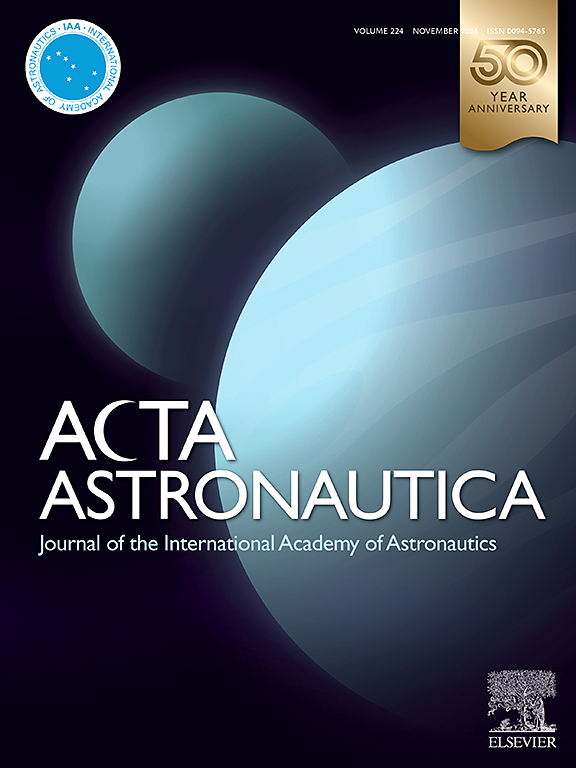不同传入动压下基于气钉喷气复合方法的减阻机制
IF 3.1
2区 物理与天体物理
Q1 ENGINEERING, AEROSPACE
引用次数: 0
摘要
在不同的入流条件下,飞机机头受到的阻力有很大不同。为了降低(高超声速)超音速飞行器机头的气动力,采用数值模拟方法分析了钝体飞行器在不同来流动压下采用气刺-逆流喷气复合方法的减阻规律和机理。研究了 H = 0.1 千米和 H = 30 千米两种环境的影响,以及不同来流马赫数对 H = 0.1 千米时阻力降低的影响。研究表明,在不同的动态压力下,飞行器存在一个最小总阻力值,而壁面压力的变化与实际运行条件有关。气刺和钝体前方的再循环区是影响阻力降低的重要流动结构。当射流总压比增加时,减阻杆头部的再循环区位置会远离模型的中心轴线。当来流动压较高时,钝体前方再循环区的分离点位于更下游的位置,重新附着点与来流和射流条件有关,与钝体壁上最大压力位置的变化趋势一致。由于射流可以有效地推开冲击波,因此当来流动压较高时,射流的减阻效果会显著增强。然而,在实际设计中需要考虑高动压导致的高射流压力。此外,高动压入流与射流形成的复杂湍流场也值得通过大涡模拟进一步研究。本文章由计算机程序翻译,如有差异,请以英文原文为准。
Drag reduction mechanism based on the aerospike-jet composite approach under different incoming dynamic pressures
The drag experienced by the nose of an aircraft varies significantly under different incoming flow conditions. In order to reduce the aerodynamic force on the nose of the (hypersonic) supersonic vehicle, the numerical simulation approach has been used to analyze the drag reduction laws and mechanisms of a blunt-body vehicle with the aerospike-counterflowing jet composite approach under different incoming flow dynamic pressures. The effects of two environments with H = 0.1 km and H = 30 km, as well as the influence of different incoming Mach numbers on the drag reduction at H = 0.1 km were investigated. The research has shown that there exists a minimum overall drag value for the vehicle under different dynamic pressures, while the variation in the wall pressure is related to the actual operating conditions. The recirculation zones at the aerospike and in front of the blunt body are important flow structures that affect the drag reduction. When the jet total pressure ratio increases, the position of the recirculation zone at the head of the drag reduction rod moves away from the central axis of the model. When the incoming flow dynamic pressure is higher, the separation point of the recirculation zone in front of the blunt body is located further downstream, and the reattachment point is related to the incoming flow and jet conditions, aligning with the trend of variation of the position of the maximum pressure on the blunt body wall. As it can effectively push away the shock wave, the enhanced drag reduction effect of the jet is significant when the incoming flow dynamic pressure is higher. However, the high jet pressure resulting from high dynamic pressure needs to be considered in the actual design. Furthermore, the complex turbulent flow field formed by the high dynamic pressure incoming flow and the jet is worthy of further study by means of the large eddy simulation.
求助全文
通过发布文献求助,成功后即可免费获取论文全文。
去求助
来源期刊

Acta Astronautica
工程技术-工程:宇航
CiteScore
7.20
自引率
22.90%
发文量
599
审稿时长
53 days
期刊介绍:
Acta Astronautica is sponsored by the International Academy of Astronautics. Content is based on original contributions in all fields of basic, engineering, life and social space sciences and of space technology related to:
The peaceful scientific exploration of space,
Its exploitation for human welfare and progress,
Conception, design, development and operation of space-borne and Earth-based systems,
In addition to regular issues, the journal publishes selected proceedings of the annual International Astronautical Congress (IAC), transactions of the IAA and special issues on topics of current interest, such as microgravity, space station technology, geostationary orbits, and space economics. Other subject areas include satellite technology, space transportation and communications, space energy, power and propulsion, astrodynamics, extraterrestrial intelligence and Earth observations.
 求助内容:
求助内容: 应助结果提醒方式:
应助结果提醒方式:


